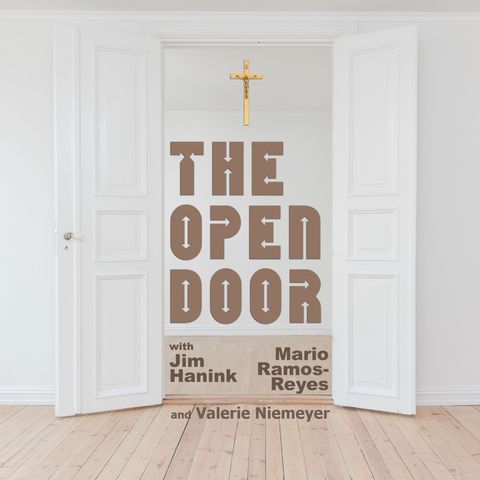
Contacts
Info
Please join us at The Open Door! We discuss solidarity, subsidiarity, economic democracy, and nonviolence in light of Catholic Social Teaching. We explore how to move from discussion to political...
show moreWe discuss solidarity, subsidiarity, economic democracy, and nonviolence in light of Catholic Social Teaching. We explore how to move from discussion to political change. Culture and politics, to be sure, are interwoven. So we care deeply about education and the arts. Our questions often lead us to report on the projects and promise of the American Solidarity Party.
Dr. James Hanink, a philosophy professor who taught at Loyola Marymount University in Los Angeles, CA, is the lead anchor for The Open Door.
Dr. Mario Ramos-Reyes, Professor of Philosophy and Latin America History and Founder of the Institute for the Study of Personalist Republicanism, is a co-host of The Open Door.
Valerie Niemeyer, a homeschooling mother of six interested in the application of Catholic Social Teaching to our citizenship and the realm of politics, is a co-host of The Open Door.

The Open Door
The Open Door
Episode 289: Andrew Mioni on the Catholic Traditionalist Movement (July 24, 2024)
Episode 288: Donald Boland, David Cooney, John Médaille, Garrick Small, and Thomas Storck on Money, Markets and Morals (July 10, 2024)
Episode 287: Msgr. Patrick Gaalaas on the Ministry of the Spiritual Director (June 26, 2024)
Episode 286: Christopher Zehnder, the General Editor for the Catholic Textbook Project (June 12, 2024)
Episode 285: Tom Venzor on the work of the State Catholic Conference Directors (May 29, 2024)
Episode 284: Dcn.Omar Gutiérrez, President and Executive Director of the Evangelium Institute (May 15, 2024)
Episode 283: Patrice Fagnant-MacArthur of Today's Catholic Homeschooling Website (May 1, 2024)
Episode 282: John A. Di Camillo, PhD, BeL., an Ethicist and Personal Consultations Director at The NCBC (April 17, 2024)
Episode 281: Peter Sonski the Politics of the Presidency and Vice Presidency (April 3, 2024)
Episode 280: Karina Fabian on The Catholic Writers Guild (March 20, 2024)
Please join us at The Open Door! We discuss solidarity, subsidiarity, economic democracy, and nonviolence in light of Catholic Social Teaching. We explore how to move from discussion to political...
show moreWe discuss solidarity, subsidiarity, economic democracy, and nonviolence in light of Catholic Social Teaching. We explore how to move from discussion to political change. Culture and politics, to be sure, are interwoven. So we care deeply about education and the arts. Our questions often lead us to report on the projects and promise of the American Solidarity Party.
Dr. James Hanink, a philosophy professor who taught at Loyola Marymount University in Los Angeles, CA, is the lead anchor for The Open Door.
Dr. Mario Ramos-Reyes, Professor of Philosophy and Latin America History and Founder of the Institute for the Study of Personalist Republicanism, is a co-host of The Open Door.
Valerie Niemeyer, a homeschooling mother of six interested in the application of Catholic Social Teaching to our citizenship and the realm of politics, is a co-host of The Open Door.
Information
| Author | WCAT Radio |
| Organization | WCAT Radio |
| Categories | Religion & Spirituality |
| Website | - |
| - |
Copyright 2024 - Spreaker Inc. an iHeartMedia Company
